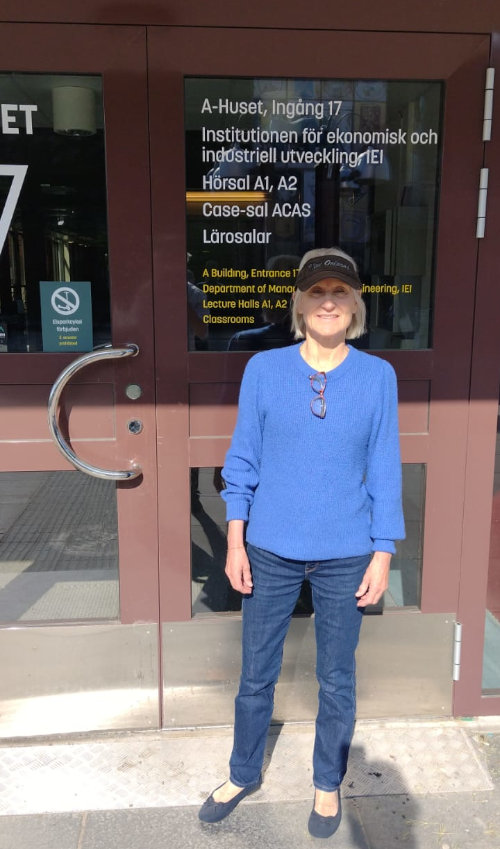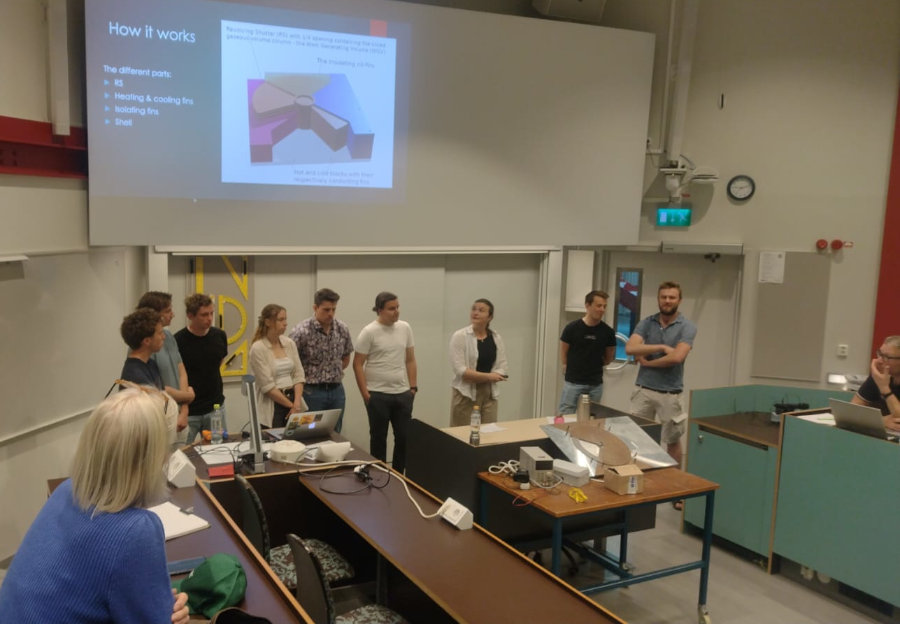
















Presentation of the GREC SUSTAINABLE REVOLUTION PART 3
at Linköping University (Li.U), Sweden
All nine members of the spring 2023 GREC Sustainable Group started with a joint introduction to their common project
building a GREC Lab-Model
Background
The severe impacts of greenhouse gas emissions on global warming are an
undeniable reality today. The emissions are associated with various sectors
where heat and electricity production were the sectors with the highest
increase of CO2 emissions in 2021. The complexity of this is even greater
than anticipated, as significant improvements have NOT been achieved since
the signing of the Paris Agreement by 196 UN countries in 2015, not
even after the COP27. Still new technology solutions to inverstigate and
fortunately, this spring (2023), three new groups at Linköping University
in Sweden are dedicated to the challenge of transitioning to a world free
from fossil fuels. The GREC SUSTAINABLE REVOLUTION PART 3 project in
Sweden thoroughly investigates a new technology aiming to be applied in
both the electricity production and transport sectors.
 Invited to the presentation at Linköping University was Eva Karlberg representing nilsinside AB
Invited to the presentation at Linköping University was Eva Karlberg representing nilsinside AB
The Green Revolution Energy Converter (GREC) sustainable research at Linköping
University are building a physical model Lab Model v3.
The presentation showcased the joint efforts of the nine members of the
spring 2023 GREC Sustainable Group. The group embarked on a common project
to build a GREC Lab-Model, aiming to understanding the behavior of the GREC
Work Generating Volume (WGV) and its real-world performance and potential
for sustainable energy production applications.
The project goal is to build a simple tight model to deliver data in the
simplest way within the specified time frame. Time is important. The model
does not need to be optimal nor elegant but it has to be able to revolve
its Work Generating Volume (WGV) with electric control at different speeds
while logging pressure and average temperatures.
The GREC Lab Model v3 will answer how a real world revolving physical "Work Generating Volume" really behaves.
• Is it possible at all to build a Lab Model with a very restricted time and money budget?
• Will the GREC perform as predicted in earlier Li.U theoretical research?
• Does theory and reality converge?
• Will the Lab Model v3 be the tool we need to understand the WGV and "dead Volume" relation?
• Will it be able to run a saturated vapor close to phase shift?
• Is the GREC a future crucial climate-positive concept for a planable,
scalable, adjustable clean energy production wihtout emissions?
After the common intro the CONSTRUCTION group, Ida H, Andrei T and Simon S, presented
their thoughtfull design which included a thicker "Revolver" but with a smaller
diameter and with a slick counter weight. They also added a hollow Revolver
shaft to channel the pressure/volume changes to an external moving boundary
(like a piston...), still within budget.
You may download the CONSTRUCTION Group Report as a .pdf file by clicking this link:
Design and development of a working prototype for the Green Revolution Energy Converter - Lab model V.3 - Project Report
The MECHATRONICS group continued the presentation and explained their
programming and method of revolving the WGV and, at the same time capture
and logging data for analysis. Tested with dry runs on the wooden sensor
set-up. Not the fastest method but performing within specifications and
budget.
You may download the MECHATRONICS Group Report as a .pdf file by clicking this link:
Development of a mechatronic solution
for a new type of heat engine - The selection of relevant electronic components and
control system for the mechatronics for the lab model of the new heat engine the Green Revolution Energy
Converter
This was followed by the THERMODYNAMICS group presentation who
integrated an electric heat source into the Lab Model design. They
also worked out a method to calculate the real world performance of the WGV
at different revolutions per minute and at different temperature spans.
You may download the THERMODYNAMICS Group Report as a .pdf file by clicking this link:
The thermodynamics of the GREC
version 3 - Investigation of engine performance and energy conversion

From the left: Eva K, Jakob R, Oskar B, Max H, Lisa V, Simon S, Andrei T, Ida H, Johan Å, Vidar J and examinator Jonas D
As flagged by the University Workshop, the construction time was
very tight so their GREC Lab Model was not fully assembled and no
tests had been done. A half assembly of the GREC with its counterweighted
Work Generating Volume "WGV" was on display on the podium.
A talented and well-read opposition group also showed up for the presentation.
We trust that this new Lab Model Version 3 will perfom in future test runs
and deliver measurement results for extrapolation to much larger volumes.
The Technology
In thermodynamic terms the GREC is a closed system with a moving boundary
where the GREC converts heat energy to kinetic energy. The GREC heats up
and cools down its internal large sliced WGV efficiently, fast and repetitively,
resulting in internal pressure changes.
These internal pressure changes are used by its moving boundary to generate
kinetic energy. You may think of the GREC as a revolving Carnot heat engine
controlled by computer logic. Please find the theoretical presentation of
the GREC on this link:
GREC Theory Presentation
The GREC is a new technological solution to tackle climate change
and luckily there are three groups at Linköping University this spring that
thrive on the challenge of a transition to fossil free energy systems. They will
construct and build the GREC Lab Model v.3 as a step in a climate positive
project that will need several research projects over time...
Please feel free to call or email:
Contact information at nilsinside AB
Nils Karlberg nils@nilsinside.com, tel +33 608 53 15 93, theory & technical questions
Sophia Karlberg sophia@nilsinside.com , strategy & admin questions
The GREC Project



































